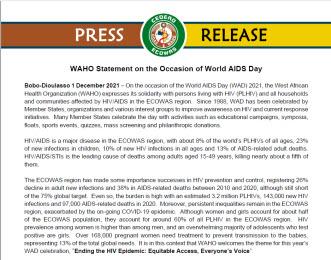
Bobo-Dioulasso 1 December 2021 – On the occasion of the World AIDS Day (WAD) 2021, the West African Health Organization (WAHO) expresses its solidarity with persons living with HIV (PLHIV) and all households and communities affected by HIV/AIDS in the ECOWAS region. Since 1988, WAD has been celebrated by Member States, organizations and various interest groups to improve awareness on HIV and current response initiatives. Many Member States celebrate the day with activities such as educational campaigns, symposia, floats, sports events, quizzes, mass screening and philanthropic donations.
HIV/AIDS is a major disease in the ECOWAS region, with about 8% of the world’s PLHIVs of all ages, 23% of new infections in children, 10% of new HIV infections in all ages and 13% of AIDS-related adult deaths. HIV/AIDS/STIs is the leading cause of deaths among adults aged 15-49 years, killing nearly about a fifth of them.
The ECOWAS region has made some importance successes in HIV prevention and control, registering 26% decline in adult new infections and 38% in AIDS-related deaths between 2010 and 2020, although still short of the 75% global target. Even so, the burden is high with an estimated 3.2 million PLHIVs, 143,000 new HIV infections and 97,000 AIDS-related deaths in 2020. Moreover, persistent inequalities remain in the ECOWAS region, exacerbated by the on-going COVID-19 epidemic. Although women and girls account for about half of the ECOWAS population, they account for around 60% of all PLHIV in the ECOWAS region. HIV prevalence among women is higher than among men, and an overwhelming majority of adolescents who test positive are girls. Over 168,000 pregnant women need treatment to prevent transmission to the babies, representing 13% of the total global needs. It is in this context that WAHO welcomes the theme for this year’s WAD celebration, “Ending the HIV Epidemic: Equitable Access, Everyone’s Voice”.
We have to boldly confront the challenges that face us. No ECOWAS country met the 90-90-90 treatment cascade target in 2020. We have a gap of an estimated total of 322,000 PLHIV who need to be tested and put on ART to reach the first and the 2nd 90%. Furthermore, the UNAIDS estimates that 72% of new HIV infections in adults aged 15 to 49 years in the Region in 2019 occurred among the key populations (KPs) and their clients and partners. Yet, we do not sufficiently prioritize KPs in our HIV programmes. KPs face stigma, discrimination and other socio-cultural barriers which hinder their access to care. The situation is made worse by the criminalisation of the sexual practices of KPs in many countries. Then also, the COVID-19 pandemic has disrupted access to HIV prevention, treatment, and retention and has been associated with gender-based violence.
To help address some of these challenges, WAHO facilitated a meeting in April 2015 at which national AIDS policy leaders, public prosecutors, police and other stakeholders committed to prioritize and better engage KPs in the HIV response in the Dakar Declaration. Subsequently, Ministers of Health adopted an integrated regional ECOWAS KP strategy on HIV/TB/hepatitis and sexual and reproductive health rights. WAHO is
supporting Member States and Partners in the area of HIV self-testing, index testing, pre-exposure prophylaxis guidelines and reduction of cross-border transmission. It is currently collaborating with Partners to collect baseline data on policies and service delivery in KPs in conformity with a scorecard in the strategy.
On the occasion of the World AIDS Day, WAHO urges ECOWAS Member States and all stakeholders to redouble their commitment to ending the HIV epidemic. We must ensure that everyone, everywhere has equal access to HIV prevention, testing, treatment and care services. We must continue to deliver essential care services and adapt HIV services to the constraints imposed by the COVID-19 pandemic. We need to mobilize more resources including predictable domestic funding, build stronger more resilient health systems, improve community engagement and strengthen our partnerships with civil society for increased accountability.
WAHO would like to commend Member States, community leaders, civil society and NGOs and all actors for their dedication to integrated HIV service delivery. We are grateful to all Partners for their technical and financial support.
Let us promote equitable access!
Let us ensure we leave no one behind!
Long live the People of the Community!
END -
About the West African Health Organization (WAHO): WAHO is the specialized institution of the Economic Community of West African States (ECOWAS) responsible for health issues. Its mission is to attain the highest possible standard and protection of health of the peoples in the sub-region through the harmonization of the policies of the Member States, pooling of resources, and cooperation with one another and with others for a collective and strategic fight against the health problems of the sub-region.
For more information on WAHO, please visit http://www.wahooas.org / https://twitter.com/OoasWaho / https://www.facebook.com/ooaswaho
Press contact: +226 20 97 57 75
